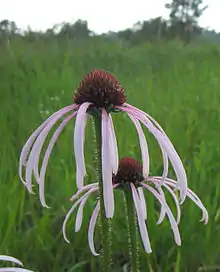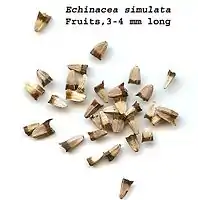Echinacea simulata
Echinacea simulata, commonly called pale purple coneflower[2] or wavy leaf purple coneflower,[3] is a species of flowering plant in the sunflower family.[4] It is native to the east-central states of the United States, including Arkansas, Georgia, Illinois, Kansas, Missouri and Tennessee.[5] The U.S. Department of Agriculture also reports it as native to North Carolina and Virginia.[6] Wavy leaf purple coneflower has a relatively small distribution, and its locations are still being determined.[7] Its natural habitat is dry, calcareous, open areas such as barrens and woodlands.[2][8]
| Echinacea simulata | |
|---|---|
 | |
| Scientific classification | |
| Kingdom: | Plantae |
| Clade: | Tracheophytes |
| Clade: | Angiosperms |
| Clade: | Eudicots |
| Clade: | Asterids |
| Order: | Asterales |
| Family: | Asteraceae |
| Genus: | Echinacea |
| Species: | E. simulata |
| Binomial name | |
| Echinacea simulata R.L.McGregor | |
| Synonyms[1] | |
| |
Description
This species blooms in late spring to midsummer. It is very similar in appearances to E. pallida, which has a different chromosome number. The most readily distinguishing morphological feature is that E. simulata has yellow pollen grains. More work is needed to determine the physical and ecological differences between these two taxa.[2]
This species grows from 50 to 100 cm (20-40 inches) tall from branched fusiform taproot. The foliage and stems with spreading hairs sparsely to densely distributed. The stems are mostly green or purple mottled. The basal leaves with petioles 4–20 cm long and the blades 3 or 5-nerved some leaves with 1 nerve, linear to lanceolate and 5–40 cm long and 0.5–4 cm wide. The leaf bases tapering gradually with leaves having entire margins, usually with ciliate hairs. Normally single flower heads produced on peduncles 20–40+ cm (8-16 inches) long. Phyllaries or bracts below the flower heads lanceolate to ovate, 7–15 mm wide and 1.5–3.5 mm long. The flowers with paleae 10–14 mm long with pinkish to purple tips, incurved and sharp-pointed. Ray corollas normally soft rose to pink colored but also rarely off white. The laminae are drooping to reflexed, 40–90 mm long and 4–7 mm wide, without hairs or sparsely hairy on the undersides. The flower heads are conic to hemispheric, 20–30 mm wide and 20–30 mm tall with Disc corollas 5–6.5 mm long, lobes pink to purplish. The seeds are produced in angled fruits called Cypselae that are tan and 3–4.5 mm long, with smooth surfaces, normally without hairs. One seed is produced per fruit and the seeds are rounded and gray-tan.[4]
 Fruits of Echinacea simulata
Fruits of Echinacea simulata
References
- The Plant List, Echinacea simulata McGregor
- "Flora of the Southern and Mid-Atlantic States".
- https://plants.usda.gov/core/profile?symbol=ECSI
- Flora of North America, Wavy-leaf purple coneflower, Echinacea simulata
- "Echinacea simulata". County-level distribution map from the North American Plant Atlas (NAPA). Biota of North America Program (BONAP). 2014. Retrieved 17 January 2017.
- https://plants.usda.gov/core/profile?symbol=ECSI
- https://uswildflowers.com/detail.php?SName=Echinacea%20simulata
- Missouri Botanical Garden
